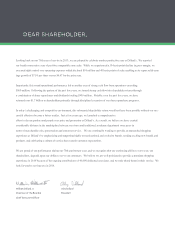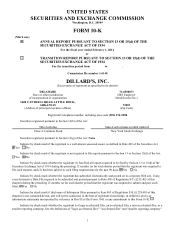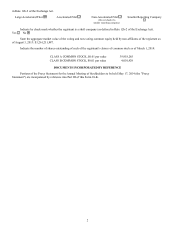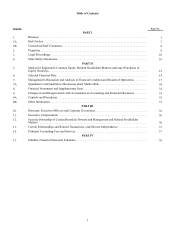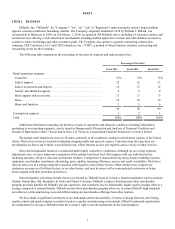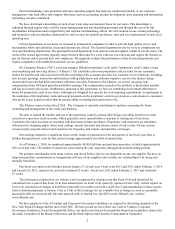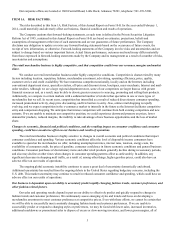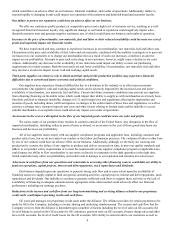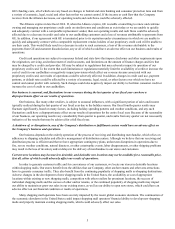Dillard's 2013 Annual Report Download - page 12
Download and view the complete annual report
Please find page 12 of the 2013 Dillard's annual report below. You can navigate through the pages in the report by either clicking on the pages listed below, or by using the keyword search tool below to find specific information within the annual report.6
Ownership and leasing of significant amounts of real estate exposes us to possible liabilities and losses.
We own the land and building, or lease the land and/or the building, for all of our stores. Accordingly, we are subject to
all of the risks associated with owning and leasing real estate. In particular, the value of the assets could decrease, and their
operating costs could increase, because of changes in the investment climate for real estate, demographic trends and supply or
demand for the use of the store, which may result from competition from similar stores in the area, as well as liability for
environmental conditions. If an existing owned store is not profitable, and we decide to close it, we may be required to record
an impairment charge and/or exit costs associated with the disposal of the store. We generally cannot cancel our leases. If an
existing or future store is not profitable, and we decide to close it, we may be committed to perform certain obligations under
the applicable lease including, among other things, paying the base rent for the balance of the lease term. In addition, as each of
the leases expires, we may be unable to negotiate renewals, either on commercially acceptable terms or at all, which could
cause us to close stores in desirable locations. We may not be able to close an unprofitable owned store due to an existing
operating covenant which may cause us to operate the location at a loss and prevent us from finding a more desirable location.
We have approximately 75 stores along the Gulf and Atlantic coasts that are covered by third party insurance but are self-
insured for property and merchandise losses related to "named storms"; therefore, repair and replacement costs will be borne by
us for damage to any of these stores from "named storms".
Litigation with customers, employees and others could harm our reputation and impact operating results.
In the ordinary course of business, we may be involved in lawsuits and regulatory actions. We are impacted by trends in
litigation, including, but not limited to, class-action allegations brought under various consumer protection and employment
laws. Additionally, we may be subject to employment-related claims alleging discrimination, harassment, wrongful termination
and wage issues, including those relating to overtime compensation. We are susceptible to claims filed by customers alleging
responsibility for injury suffered during a visit to a store or from product defects, and we are also subject to lawsuits filed by
patent holders alleging patent infringement. These types of claims, as well as other types of lawsuits to which we are subject
from time to time, can distract management's attention from core business operations and impact operating results, particularly
if a lawsuit results in an unfavorable outcome.
Our profitability may be adversely impacted by weather conditions.
Our merchandise assortments reflect assumptions regarding expected weather patterns and our profitability depends on
our ability to timely deliver seasonally appropriate inventory. Unexpected or unseasonable weather conditions could render a
portion of our inventory incompatible with consumer needs. For example, extended periods of unseasonably warm
temperatures during the winter season or cool weather during the summer season could render a portion of the Company's
inventory incompatible with those unseasonable conditions. Additionally, extreme weather or natural disasters, particularly in
the areas in which our stores are located, could also severely hinder our ability to timely deliver seasonally appropriate
merchandise. For example, frequent or unusually heavy snowfall, ice storms, rainstorms or other extreme weather conditions
over a prolonged period could make it difficult for the Company's customers to travel to its stores and thereby reduce the
Company's sales and profitability. A reduction in the demand for or supply of our seasonal merchandise or reduced sales due to
reduced customer traffic in our stores could have an adverse effect on our inventory levels, gross margins and results of
operations.
Natural disasters, war, acts of terrorism, other armed conflicts, and public health issues may adversely impact our business.
The occurrence of, or threat of, a natural disaster, war, acts of terrorism, other armed conflicts, and public health issues
could disrupt our operations, disrupt international trade and supply chain efficiencies, suppliers or customers, or result in
political or economic instability. If commercial transportation is curtailed or substantially delayed our business may be
adversely impacted, as we may have difficulty shipping merchandise to our distribution centers, fulfillment centers, stores, or
directly to customers. As a result of the occurrence of, or threat of, a natural disaster or acts of terrorism in the United States,
we may be required to suspend operations in some or all of our stores, which could have a material adverse impact on our
business, financial condition, and results of operations.
Increases in the cost of employee benefits could impact the Company's financial results and cash flows.
The Company's expenses relating to employee health benefits are significant. Unfavorable changes in the cost of such
benefits could impact the Company's financial results and cash flows. Healthcare costs have risen significantly in recent years,
and recent legislative and private sector initiatives regarding healthcare reform could result in significant changes to the U.S.
healthcare system. Many of our employees who currently choose not to participate in our healthcare plans may find it more
advantageous to do so as a result of recent changes to healthcare laws in the United States. Such changes include potential
penalties on persons for not obtaining healthcare coverage and being ineligible for certain healthcare subsidies if an employee
is eligible and offered qualifying and affordable healthcare coverage under an employer's plan. If a large portion of eligible
employees who currently choose not to participate in our plans choose to enroll as a result of the law change, it may


